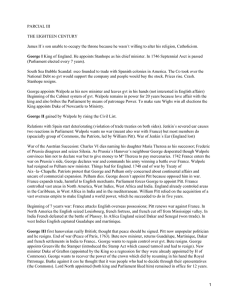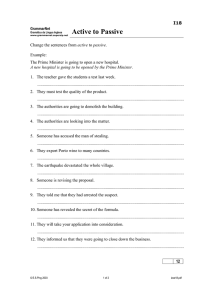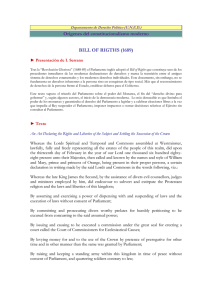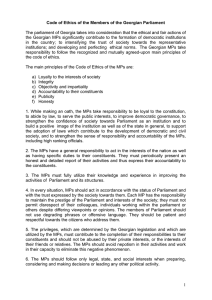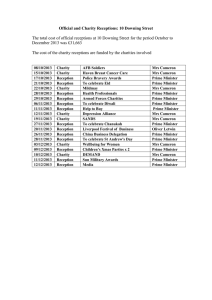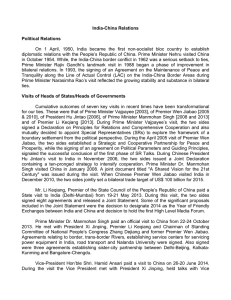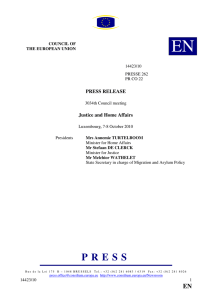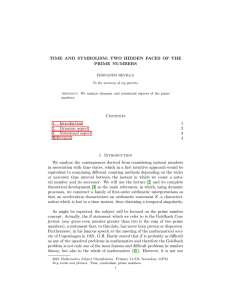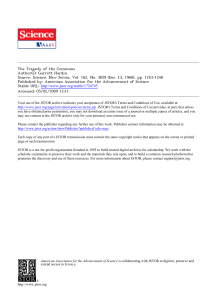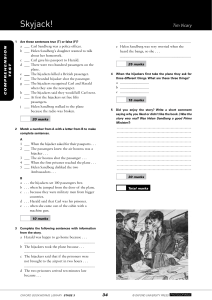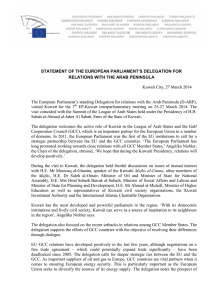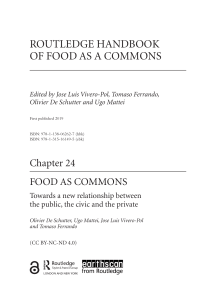Sistema político inglés
Anuncio
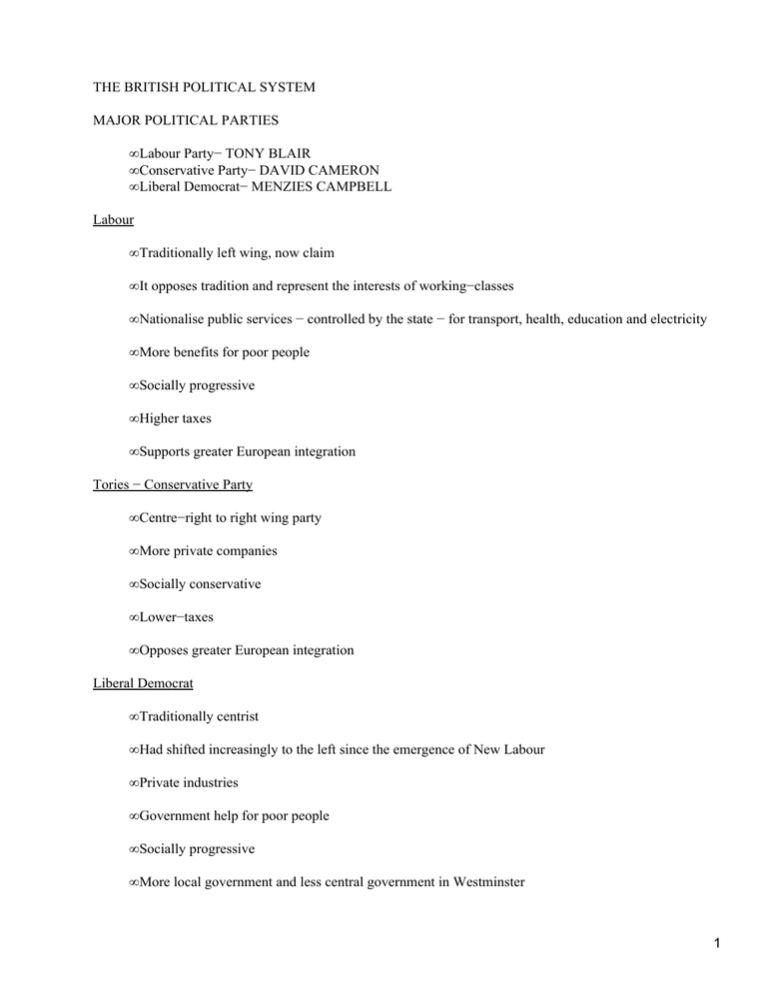
THE BRITISH POLITICAL SYSTEM MAJOR POLITICAL PARTIES • Labour Party− TONY BLAIR • Conservative Party− DAVID CAMERON • Liberal Democrat− MENZIES CAMPBELL Labour • Traditionally left wing, now claim • It opposes tradition and represent the interests of working−classes • Nationalise public services − controlled by the state − for transport, health, education and electricity • More benefits for poor people • Socially progressive • Higher taxes • Supports greater European integration Tories − Conservative Party • Centre−right to right wing party • More private companies • Socially conservative • Lower−taxes • Opposes greater European integration Liberal Democrat • Traditionally centrist • Had shifted increasingly to the left since the emergence of New Labour • Private industries • Government help for poor people • Socially progressive • More local government and less central government in Westminster 1 • Supports greater European integration MAJOR NATIONAL ISSUES In current British national politics • They are, in descending order of voter concern: • Race relations/immigration • Defence/terrorism • Law and order • The national health service • Education • Pollution and the environment • The state of the economy • Housing and house prices • Pensions and benefits • Taxation DIAGRAMMATIC REPRESENTATION OF THE POLITICAL HIERARCHY THE SOVEREIGN • Head of the state ( Head of the Parliament, the Government and the Law Courts) • Can only reign with the support of The Parliament • Powers are not defined precisely: ♦ Theoretically: ◊ Every act of government is done in her name ◊ She appoints all the ministers, including the Prime Minister ♦ In reality: ◊ The Monarch takes no part in the decision−making process ◊ Everything is done on the advice of the elected govern • However, she has a central role in state affairs: she meets the Prime Minister every week and receives copies of all cabinet papers. • Nevertheless, she is expected to be impartial or `above politics' and any advice she may offer the Prime Minister is kept in secret • Functions of the Sovereign: • Opening and closing Parliament 2 • Approving the appointment of the Prime Minister • Giving her Royal assent to bills • Giving honours such as peerages, knighthoods and medals • Head of the Commonwealth • Head of the church of England • Commander−in−chief of the armed forces THE PARLIAMENT • Parliament and the Monarch have different roles in the government of the country and they only meet on symbolic occasions such as: ♦ The coronation of a new monarch ♦ The opening of the Parliament • Functions of Parliament: • Providing money for the government through taxation • examining government policy, administration and spending • debating political questions • making laws • House of Lords − members known as `'peers'': ♦ Not a fixed number of members ♦ Currently 751 members ◊ The Archbishops of Canterbury and York ◊ The most senior bishops of the church of England ◊ 633 life Peers ◊ Heredity Peers ◊ The 2 Great Officers of State ♦ Officially appointed by the Queen on the advice of the government for various services to the nation ♦ Not elected ♦ Don't receive a salary ♦ No real power ♦ Some would like to abolish it • House of Commons − members known as `MP' or Members of Parliament: 3 ♦ Members elected by voters of 650 constituencies (constituency: any of the areas of a country that elect a representative to Parliament) ♦ Elected either at a general election or a by−election following the death or retirement of an MP ♦ Real power: it is here where new bills are introduced as a debate Making New Laws: Bills and Acts • A bill is a proposal for new law • May be introduced either in the House of Commons or House of Lords by any member in practice − most are proposed by the government • After being discussed (and changed) and on agreement is reached, it is send to the other House: same process • When both Houses agree on a text, it is sent to the Queen for her signature (or `'Royal assent''), at which point it becomes an Act of Parliament • About 50 bills become Acts every year • Although a bill must be supported by all three bodies (Commons, Lords, Queen), a bill which has been passed by the House of Commons (by the majority of members) is almost certain to become law • The House of Lords can revise bills but cannot stop them from becoming Acts − it can only delay the process • The Royal assent is a mere formality • There is no written constitution in Britain: ♦ There are no special procedures for changing the laws which govern the country ♦ If a political party has a clear majority in the House of Commons it can make new laws and give itself new powers ♦ This allows a government to make radical changes in the law Local Government • Parliament in London is responsible for deciding national policy, but many public services are provided by local government: education, libraries, police and fire services, road buildings, etc • The UK is divided into administrative areas known as `counties'. Each one has `county town' where the offices of the local government are located THE GOVERNMENT • Departments and ministries are run by civil servants, who are permanent officials. Even if the government changes after an election, the same civil servants are employed 4 • The Prime Minister: ♦ Leader of the government ♦ Also an MP, usually the leader of the political party with a majority in the House of Commons ♦ Functions: • Leading the majority party • Running the government • Appointing cabinet Ministers and other ministers • Representing the nation in political matters The Cabinet • The Prime Minister is advised by a Cabinet of about 20 other Ministers • The Prime Minister has considerable individual power, he can: ♦ Introduce and control policies ♦ Change the cabinet by: ◊ Appointing new ministers ◊ Sacking old ones ◊ Reshuffling the cabinet by moving its members • The leader of the Opposition also chooses MPs to take responsibility for opposing the Government in these areas. They are known as `The Shadow Cabinets'. • Each minister is responsible for a particular area of government and for a Civil Service Department. For example: ♦ The Minister of Defence is responsible for defence policy and the armed forces ♦ The Chancellor of Exchequer for financial policy ♦ The home secretary for, among other things, law and order and immigration ♦ Their civil service departments are called: `The Ministry of Defence,' `The Treasury `and `The Home Office'. • It meets in private and its discussions are secret • When a policy has been decided, an individual minister must either support it or resign, because the cabinet acts a one body with `collective responsibility' 5 The Electoral System • Parliamentary elections must be held every 5 years at the latest • Everyone over the age of 18 can vote in an election, except prisoners, Lords and mentally ill • The election is decided on a simple majority: the candidate with the most votes wins. This ` first past the post' system is clear, familiar and simple but means that the candidate who comes 2nd gets nothing ♦ Small minority parties in the House of Commons would like to change the electoral system: they want MPs to be elected by proportional representation. Under this system,, the number of MPs from each party would correspond to the total number of MPs from each party receives in the election ♦ Many people think that this system is unfair because the wishes of those who voted for the unsuccessful candidates are not represented at all • The election timetable: ♦ The date is announced to the Cabinet ♦ The Prime Minister formally asks the Sovereign to dissolve Parliament. Once the Parliament is dissolved, all MPs are unemployed, but government officers continue to function ♦ Party manifestos are published and campaigning begins throughout the country, lasting for about 3 weeks with large−scale press, radio and TV coverage ♦ Voting takes place at the polling day (usually Thursday): the results from each constituency are announced as soon as the votes have been counted, usually the same night. The national result is known by the next morning at latest ♦ As soon as it is clear that one party has a majority of seats in the House of Commons, its leader is formally invited by the Sovereign to form a government 1 The Crown The House of Lords The Government The House of Commons The People The Parliament ♦ 6
